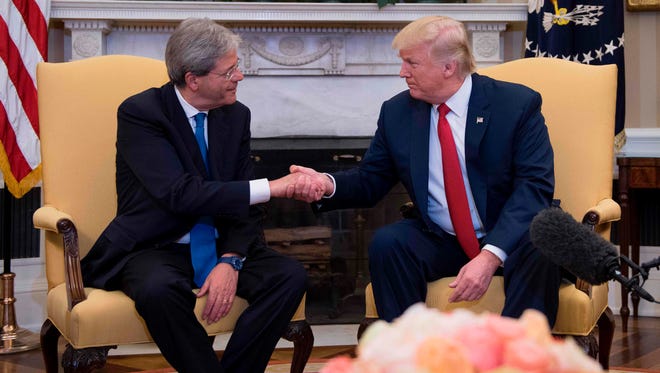Trump optimistic he can tackle health care bill and North Korea threat

WASHINGTON – Facing an array of challenges in Congress and across the globe, President Trump said Thursday he is confident he can block North Korea's nuclear program, get a health care bill though the House, and avoid a government shutdown that could occur late next week.
"As far as keeping the government open, I think we want to keep the government open, don't you agree?" Trump told reporters in a joint news conference with Italian Prime Minister Paolo Gentiloni.
Trump, who plans to visit Italy next month for a Group of Seven industrial nations summit, said he also looks forward to meeting with Pope Francis during that trip. White House spokesman Sean Spicer later said planning for a Trump-Francis meeting is underway, but there is not yet a specific date.
While praising Italy for its "deep ties of history and friendship" with the United States, Trump said he wants to the make the relationship "even more productive" by forging fairer trade deals and having Italy contribute more to common national defense. "Italy is a spectacular place; I know it well," Trump said.
The Italian leader vowed to help the United States combat terrorist threats from the Islamic State – including through contributions to the North Atlantic Treaty Organization's "collective security" – and to seek a peaceful solution to the civil war in Syria.
"I also told President Trump that we have confidence, even though this is a difficult moment," Gentiloni said at one point.
The two leaders spoke with reporters after a meeting at the White House that focused on cooperation within NATO, counterterrorism, and an upcoming international economic summit to be held in Italy.
During the news conference, Trump also:
- Said Iran is not "living up to the spirit" of its nuclear agreement with the United States, even though his State Department certified this week that Tehran is complying with the specific terms of the deal. Trump did not define what he mean by "spirit" and did not say whether or not the United States plans to pull out of the agreement. "We will see what happens," he said.
- Offered condolences to France on the latest attack, saying there is "a very, very terrible thing that's going on in the world today... what can you say? It just never ends."
- Expressed hope that China will help "do something" with the "menace" of nuclear-armed North Korea. Trump declined to say whether he thinks North Korean leader Kim Jong-Un is mentally stable enough to be reasoned with, but added that "I hope the answer is a positive one, not a negative one" and "hopefully that will be something that gets taken care of."
Amid reports that White House aides are planning to push for a new health care vote next week, Trump said he is confident that House Republicans would eventually pass something: "I believe we will get it, and whether it's next week or shortly thereafter," he said.
While a group of GOP conservatives blocked a White House-backed plan just a month ago, Trump said his staff and party leaders continue to work together.
"There was never a give-up," Trump said.
Congress must also pass some kind of spending bill next week ahead of an April 28 deadline to keep the government operating. Trump predicted that "we'll get both" a health care bill and a spending bill.
Meanwhile, as for Italy, Trump has criticized European countries over immigration and refugees policies, trade deals, and what he calls inadequate contributions to NATO. He struck a more positive tone with Gentiloni, telling the Italian leader that "together, we can address many pressing challenges." But there were also traces of tension.
In calling for "reciprocal" trade deals, Trump said he loves that word "because we don't have too many reciprocal trading partnerships, I will tell you that, but we will very soon." At another point, the president said that "we must also reaffirm the requirement that everyone must pay their full and fair share for the cost of defense."
For his part, Gentiloni said "we are proud of our contribution" to mutual defense.
Read more:
The first 100 days of the Trump presidency
Trump changes more and more positions as his staff tries to explain why
Before his trip to the White House, Gentiloni spoke to a Washington think tank and said that countries must work together promote security in the area around the Mediterranean Sea, a region that has seen overwhelming refugee flows from war-torn countries such as Syria, religious violence, and terrorist threats against Western targets.
"Italy is committed to tackle the root causes of these challenges, but we have to do it all together," Gentiloni told the Center for Strategic & International Studies.
Trump is scheduled to travel to Italy next month for the G-7 meeting, his first international summit. In addition to the U.S. and Italy, the G-7 includes Germany, France, Britain, Canada, and Japan.
"And I look very much forward to meeting the pope," the president said at the news conference.
In praising Italian culture, Trump cited contributions "from Venice to Florence, from Verdi to Pavarotti – a friend of mine, great friend of mine." The opera tenor Luciano Pavarotti died in 2007.
The Italy meeting took place two weeks after Trump ordered a missile strike on Syria after evidence that its government conducted a chemical weapons attack against rebels.
In his remarks at CSIS, Gentiloni expressed support of the missile strike, calling it "a clear message" to Syrian dictator Bashar al-Assad. He added, "this doesn't mean, from our point of view, that we can imagine a military solution of the Syrian crisis."
